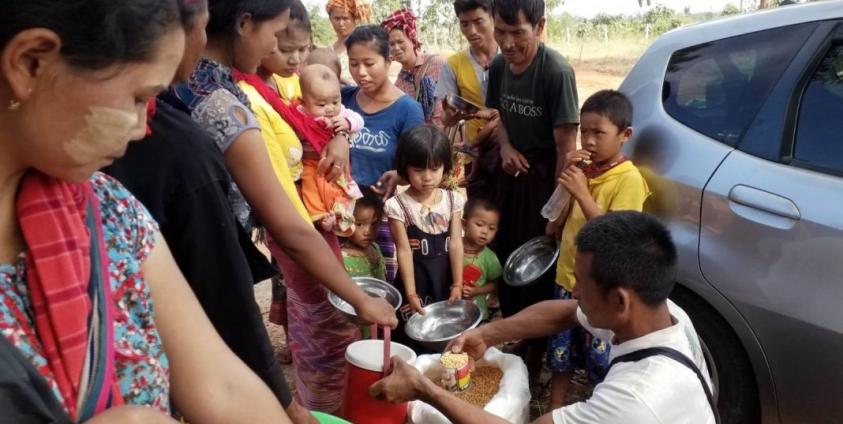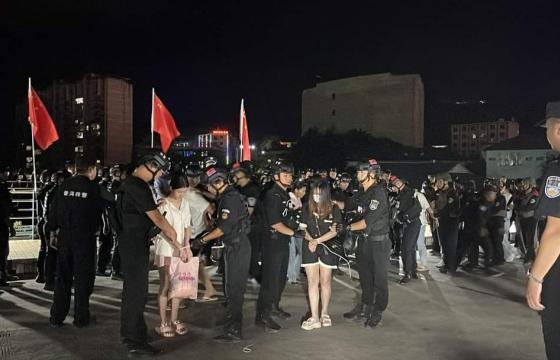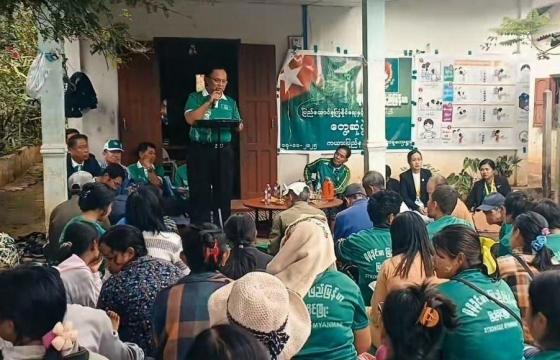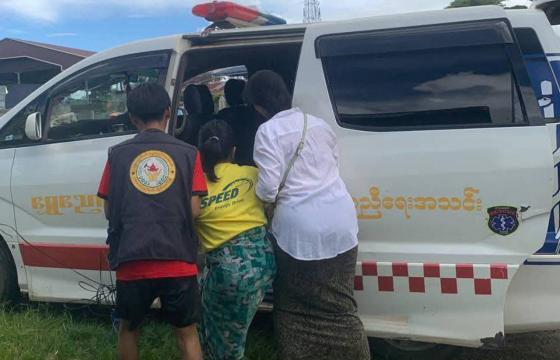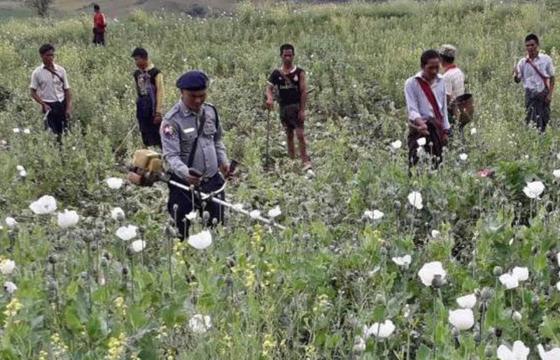Sai Harn Lin — “Even if I’m itchy and burned from the sun while working in the cornfield, on the one hand, I have to think about providing for my family and survival," Daw Hsa Tina, a 37- year-old pregnant lady, mumbled.
Daw Hsa Tina is currently eight months pregnant and seeking safety in one of the IDP camps in the township of Hsi Hseng.
Daw Hsa Tina was among those forced to abandon their homes and belongings as a result of armed clashes between the People's Defense Force (PDF) and the SAC regime. SAC launched heavy weaponry and artillery shells that fell near Padoma village, Demoso township, Karenni/Kayah State, in October 2022.
Daw Hsa Tina was around 3 months pregnant when she started relocating and four family members were forced to flee through the forest and seek refuge in Hsi Hseng Township.
“We couldn’t remain in the village because of clashes and military shelling nearby. We had been scrambling about the forest hiding in various places till we ultimately arrived at Hsi Hseng,” Daw Hsa Tina detailed her experience fleeing clashes.
Her pregnancy was four months old when she arrived at the IDP camp, and she was worried that as an IDP, the hospital, clinics, or nurses would refuse to take her for a medical check-up or antenatal care.
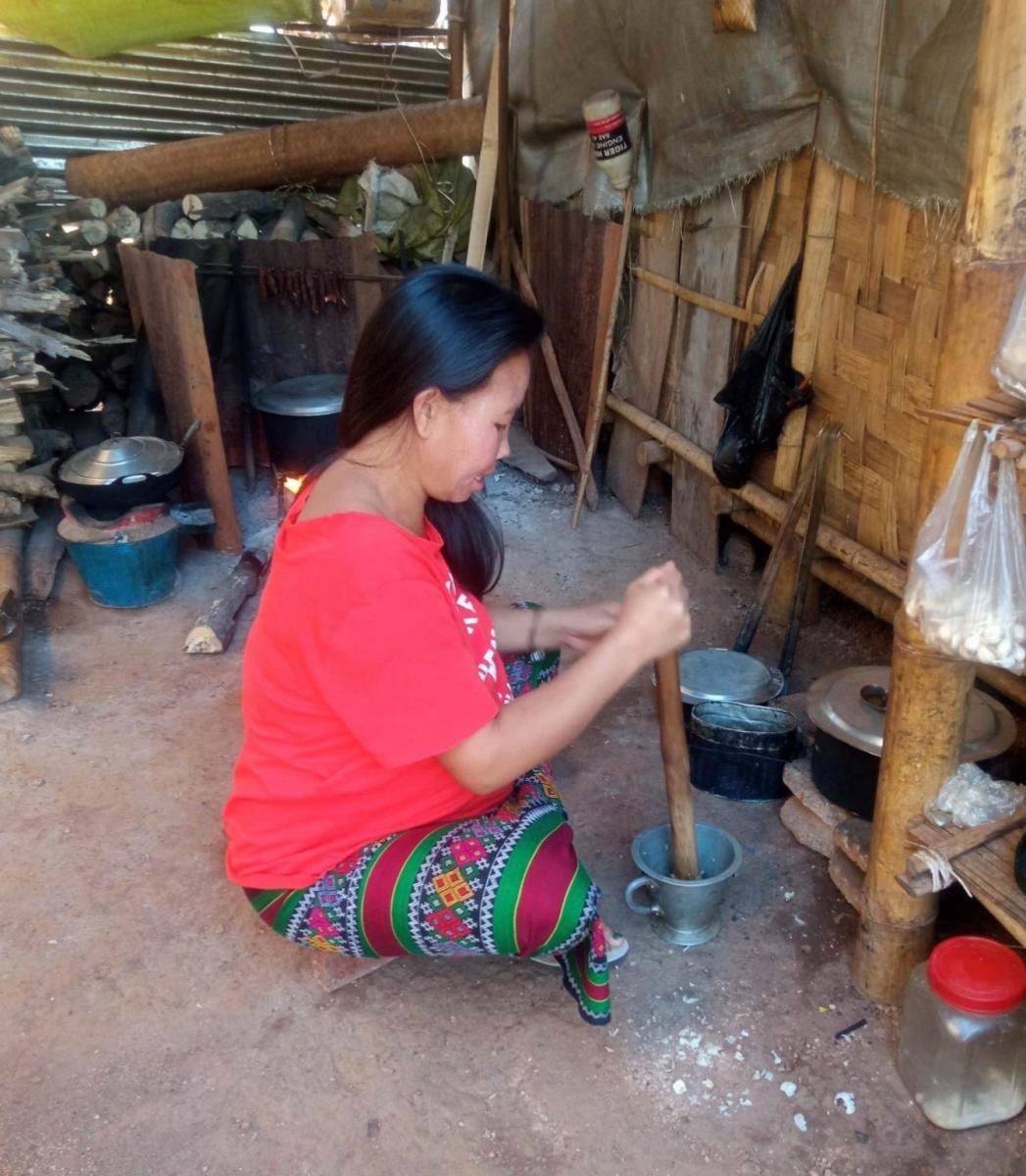
“When I was four months pregnant, I went to the clinic to get my pregnancy tested for ANC care. I was concerned at first that because I was an IDP, the midwives or physicians would not allow me to get the treatment,” Daw Hsa Tina said.
She was unable to take any of their belongings with her since she had to flee for her safety while pregnant and with two children in the midst of violent situations.
Daw Hsa Tina’s eldest son is presently residing with relatives (his aunt) at an IDP camp in Karenni (Kayah) State since he is not happy in the IDP camp in Hsi Hseng, she added sadly.
“My older son is currently in seventh grade. He was staying with me awhile ago. He eventually went to stay with his aunt in the IDP camps in Karenni (Kayah) state, which are located in the forest. He attends school there. I was quite concerned for him whenever I heard that there were armed clashes in their area. I always ask him to come and stay with us here, but he refuses. He insists he wants to go to school there and won’t be returning,” Daw Hsa Tina commented unhappily.
The IDP camp is accommodating over 400 people, so living conditions are quite challenging. The IDPs must rely on donor donations and assistance, which have declined recently. Therefore, Daw Hsa Tina feels compelled to struggle and engage in menial and seasonal work despite her pregnancy.
“ Corn harvesting is also a job. Sometimes I feel ashamed and humiliated, wondering what others would say if they see me pregnant yet working. I’m also concerned that I won’t be able to handle the same amount of work as others. There have been a lot of thoughts running through my head. But, I must strive and work in order to provide for my children,” Daw Hsa Tina opened up about her hardships and troubles.
She went on to claim that even though she picks corn for a day’ s salary of 9,000 kyats, it is hardly enough to feed her four family members and save for the costs of giving birth.
“I still need to work while being pregnant. Since we still need to provide for the family, I can’ t live without it, so I must work. I work two days and take one day off since I’m pregnant. My whole body was aching when I got home from work. It’s not that easy,” Daw Hsa Tina lamented.
According to a report issued in June 2022 by the Karen Human Rights Group (KHRG), maternal and child health services have deteriorated since the military takeover, and pregnant women who have been forced to evacuate their homes face dangerous circumstances while giving birth.
The report also noted that the support for medical aid and the transportation of medical supplies are being hindered and limited, and that the situation with regard to accessibility to medical and health care is deteriorating.
It is also mentioned in the KHRG’s report that the military regime is targeting health personnel, so there are fewer services and facilities available, especially in rural regions where there is already limited access to medical treatment. The IDPs wouldn’t get medical care or services without health workers and medical staff.
According to Daw Hsa Tina, pregnant women from the IDP camp in the Hsi Hseng township are permitted to visit the clinic once per month for a checkup.
There are 24 pregnant women living in the IDP camp in Hsi Hseng township. According to a local helping the IDP, those pregnant women who are about to give birth or are about 8-months pregnant require financial assistance for the delivery.
In the past, pregnant women from the IDP camp were allowed to give birth at the public hospital in Hsi Hseng free of charge. The person helping the IDPs claims that they were formerly allowed to do so, but that is no longer the case, and that they must now pay for everything, including drinking water, minor medications such as painkillers at the hospital.
“ Nowadays, there are costs associated with hospital admission. One has to travel to the hospital for a safe delivery. In the past, the hospital would pay for half and the patients would pay the rest. Nevertheless, nobody is offering any support at the moment. People must purchase some medications from the public hospital,” a local helping the IDPs was added.
According to one of the pregnant ladies, because the majority of pregnant women are seeking safety in IDP camps and there are few employment prospects available, they are unemployed and don't have the money necessary to pay for childbirth.
If a pregnant woman chooses to give birth naturally, she can do it at the township-level hospital, but have to pay at least 200,000 Kyats. Otherwise, only the state-run hospital could perform the non-traditional C-section delivery, which would be more expensive.
In light of the political crisis, commodity prices are increasing. According to individuals who are supporting the IDPs, in order to give birth at the Hsi Hseng hospital (township level), one would need at least 200,000 Kyats, while in order to give birth at Taunggyi (State level hospital), one would need at least 500,000 Kyats.
Due to her inability to pay for it, Ma Hsu, who is eight months pregnant and due shortly, is concerned.
“ If things are becoming better, I would prefer to return to my home in Karenni (Kayar) State to give birth. However, the circumstances in Loi Kaw are not favorable, so I hesitate to go back. I don’t have any relatives in Hsi Hseng, so I don’t know how shoul I manage my birth-giving. Maybe I should seek the services of a midwife,” remarked Ma Su, who is expecting.
Pregnant women in Hsi Hseng IDP camps are concerned because they have to work every day to make ends meet while being significantly pregnant due to increased commodities prices on the one hand and unemployment on the other.
To earn enough money to save for the cost of giving birth in the current situation, Daw Hsa Tina must work every day in both the heat and the cold.
“I’d like to give birth at home if at all feasible. There are several difficulties and challenges here unlike living at home. Also, I am concerned that something may go wrong when I deliver the baby,” Daw Hsa Tina lamently stated.


